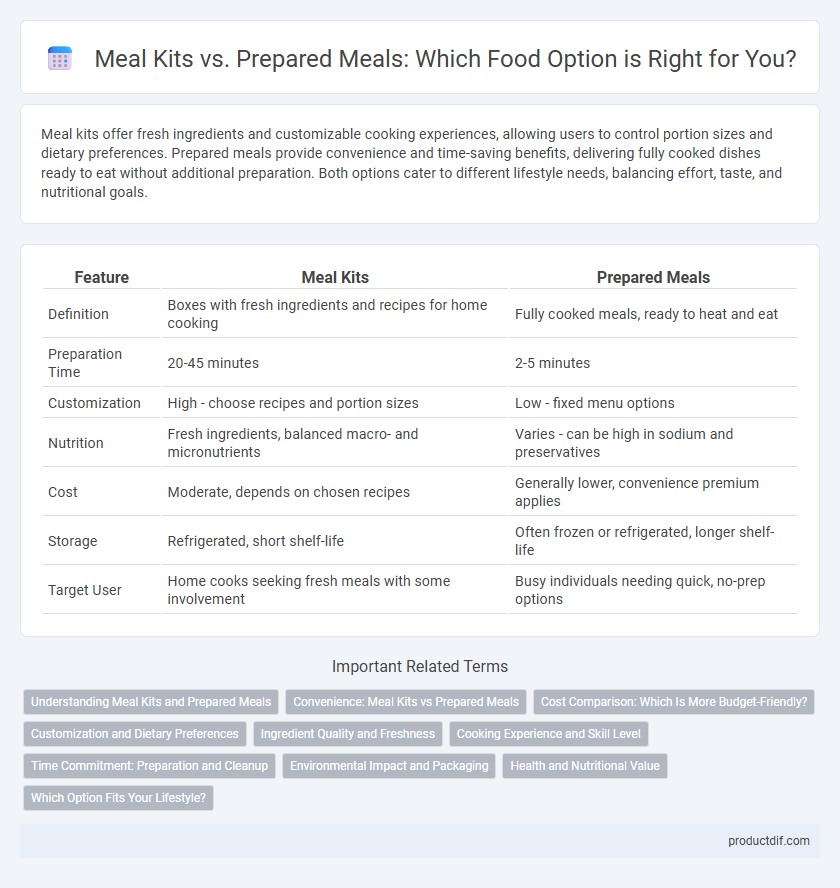Meal kits offer fresh ingredients and customizable cooking experiences, allowing users to control portion sizes and dietary preferences. Prepared meals provide convenience and time-saving benefits, delivering fully cooked dishes ready to eat without additional preparation. Both options cater to different lifestyle needs, balancing effort, taste, and nutritional goals.
Table of Comparison
| Feature | Meal Kits | Prepared Meals |
|---|---|---|
| Definition | Boxes with fresh ingredients and recipes for home cooking | Fully cooked meals, ready to heat and eat |
| Preparation Time | 20-45 minutes | 2-5 minutes |
| Customization | High - choose recipes and portion sizes | Low - fixed menu options |
| Nutrition | Fresh ingredients, balanced macro- and micronutrients | Varies - can be high in sodium and preservatives |
| Cost | Moderate, depends on chosen recipes | Generally lower, convenience premium applies |
| Storage | Refrigerated, short shelf-life | Often frozen or refrigerated, longer shelf-life |
| Target User | Home cooks seeking fresh meals with some involvement | Busy individuals needing quick, no-prep options |
Understanding Meal Kits and Prepared Meals
Meal kits provide pre-portioned ingredients with step-by-step recipes, enabling home cooks to prepare fresh meals while controlling ingredients and cooking techniques. Prepared meals are fully cooked, ready-to-eat dishes designed for convenience, often requiring only reheating. Understanding differences in preparation time, nutritional control, and ingredient freshness is essential for choosing between meal kits and prepared meals.
Convenience: Meal Kits vs Prepared Meals
Meal kits offer customizable ingredients with step-by-step instructions, providing fresh cooking experiences while saving time on meal planning. Prepared meals deliver maximum convenience by requiring no cooking or assembly, allowing immediate consumption or quick reheating. Both options cater to busy lifestyles, but prepared meals excel in time-saving convenience, whereas meal kits balance convenience with a hands-on cooking approach.
Cost Comparison: Which Is More Budget-Friendly?
Meal kits typically cost between $8 and $12 per serving, offering fresh ingredients and the experience of cooking at home, which can reduce food waste and allow for portion control. Prepared meals usually range from $6 to $10 per serving, providing convenience and time savings but sometimes at the expense of higher sodium and preservatives. For budget-conscious consumers, meal kits may be more cost-effective when considering long-term health benefits and reduced grocery expenses, while prepared meals offer immediate savings on time and effort.
Customization and Dietary Preferences
Meal kits offer extensive customization options, allowing consumers to select ingredients and portion sizes that cater to specific dietary preferences such as vegan, gluten-free, or keto. In contrast, prepared meals typically provide limited flexibility, often designed for convenience with fixed recipes that may not fully accommodate individual nutritional requirements. Selecting meal kits supports personalized meal planning and dietary adherence more effectively than ready-to-eat prepared meals.
Ingredient Quality and Freshness
Meal kits offer high-quality, fresh ingredients sourced directly from farms, allowing consumers to control the cooking process and customize their dishes. Prepared meals often rely on pre-cooked components that may contain preservatives to extend shelf life, potentially compromising ingredient freshness. Selecting meal kits generally ensures fresher, less processed ingredients, contributing to superior taste and nutritional value.
Cooking Experience and Skill Level
Meal kits offer a hands-on cooking experience that helps improve culinary skills by providing fresh ingredients and step-by-step recipes tailored for beginners to intermediate cooks. Prepared meals require minimal effort and cooking knowledge, delivering convenience for those with limited time or kitchen expertise. Choosing between the two depends on whether the goal is to develop cooking proficiency or prioritize ease and speed in meal preparation.
Time Commitment: Preparation and Cleanup
Meal kits require a moderate time commitment for meal preparation, typically 20 to 40 minutes, plus additional cleanup of packaging and cooking utensils. Prepared meals significantly reduce time investment by eliminating cooking, requiring only reheating in 5 to 10 minutes, with minimal cleanup, often just washing a plate or container. Consumers seeking convenience prioritize prepared meals, while those wanting cooking involvement and fresh ingredients often choose meal kits despite the extra cleanup.
Environmental Impact and Packaging
Meal kits often generate less overall food waste than prepared meals by providing pre-portioned ingredients, reducing the environmental footprint related to food overproduction. However, meal kits typically involve significant packaging materials, including plastic and single-use containers, which can increase environmental impact if not properly recycled. Prepared meals commonly use bulk packaging that may be less wasteful per serving but tend to have higher energy use in processing and refrigeration, contributing differently to their environmental footprint.
Health and Nutritional Value
Meal kits offer customizable ingredient options that allow for control over portion sizes, sodium levels, and fresh produce inclusion, promoting balanced nutrition tailored to individual dietary needs. Prepared meals often prioritize convenience but may contain higher sodium, preservatives, and lower fiber content, potentially impacting long-term health negatively. Nutritional value varies widely, so analyzing ingredient transparency and nutrient profiles is crucial for making healthier meal choices.
Which Option Fits Your Lifestyle?
Meal kits offer customizable ingredients and cooking flexibility ideal for those who enjoy hands-on meal preparation and want control over dietary preferences. Prepared meals provide convenience and time-saving benefits, perfect for busy individuals or those seeking quick, nutritious options without cooking. Evaluating your daily schedule, cooking skills, and health goals helps determine whether meal kits or prepared meals better fit your lifestyle.
Meal kits vs Prepared meals Infographic

 productdif.com
productdif.com